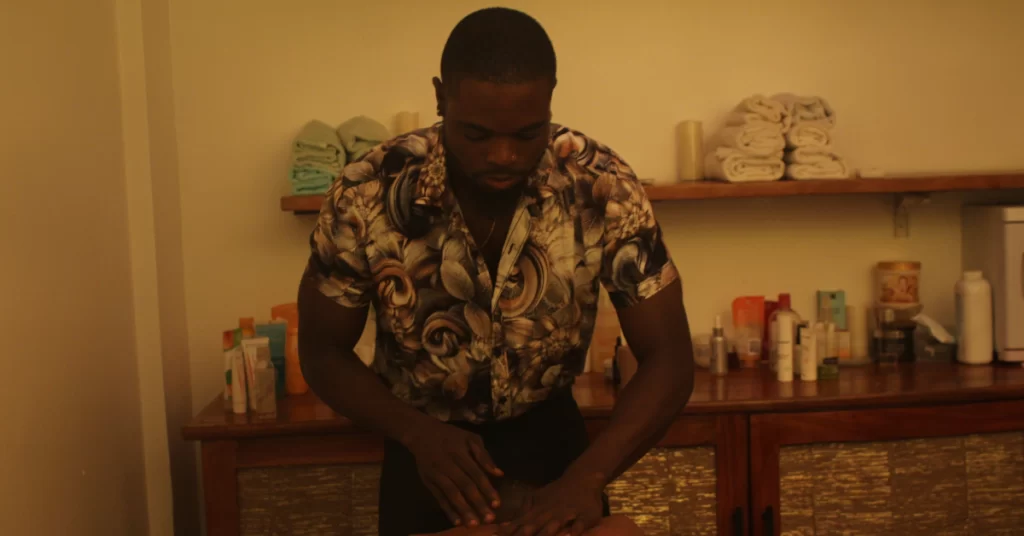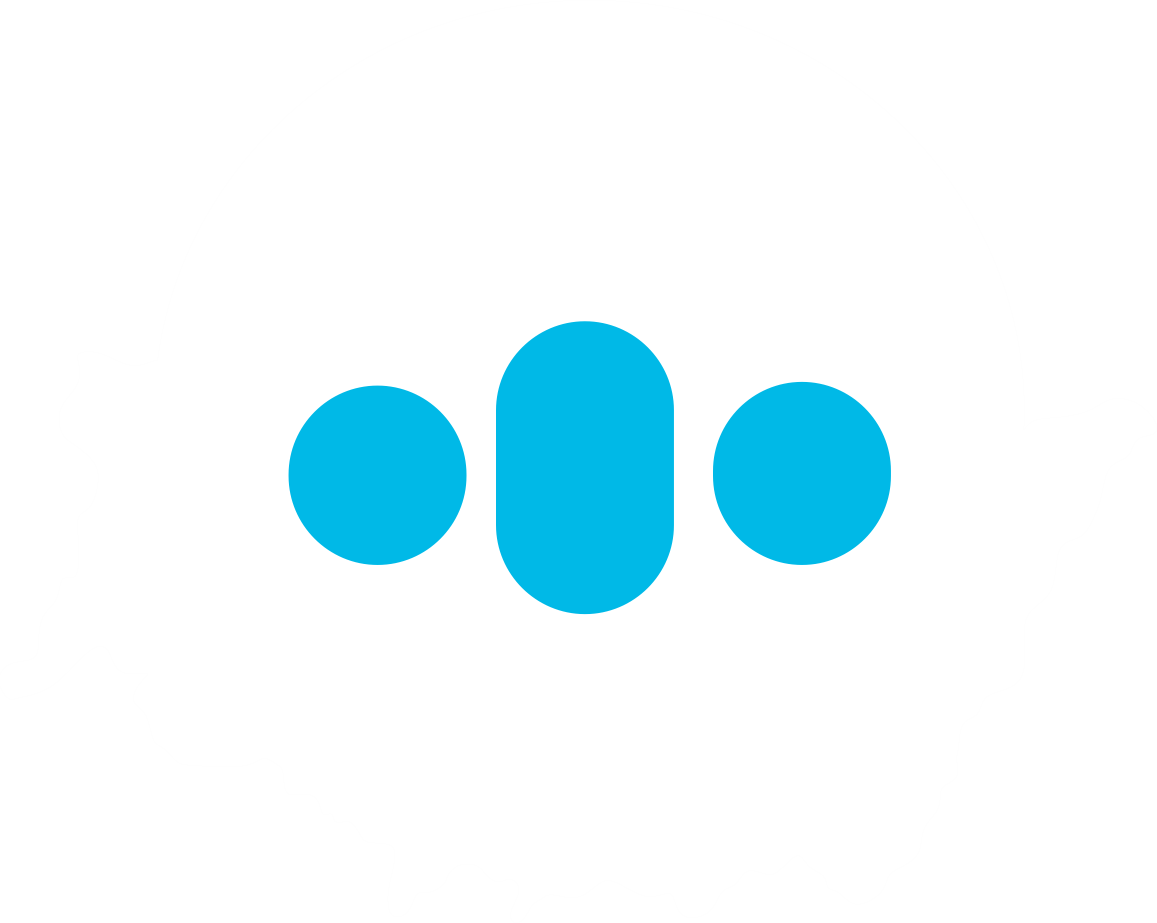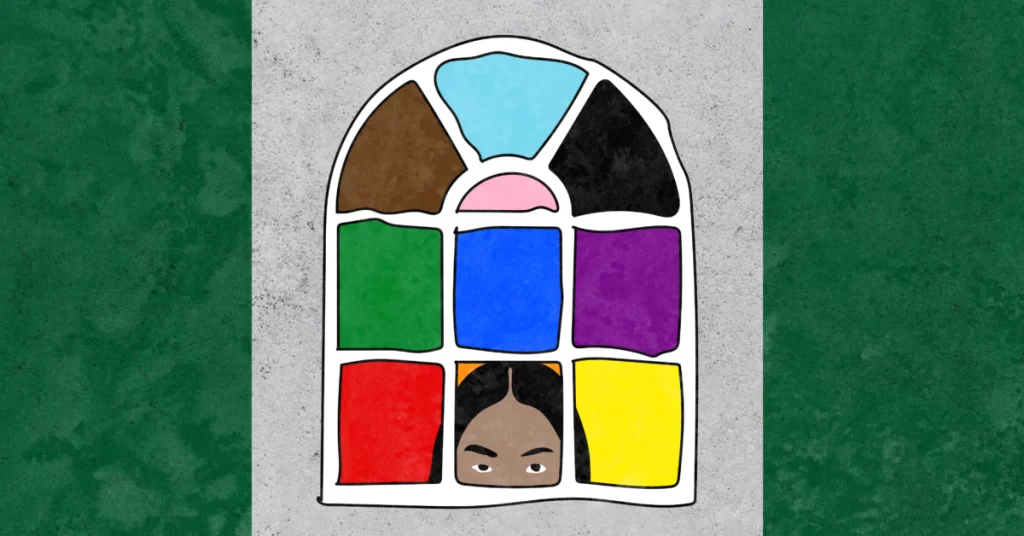A 2020 research by The Conversation showed that over 90% of reported rape victims in two major Nigerian newspapers were women. While not a conclusive picture of rape in Nigeria, the research is evidence that there are very few reported cases of male rape in Nigeria. This new film delves into why.

By: SAMUEL BANJOKO
Ogun, Nigeria (Minority Africa) — A friend casually mentioning the harassment massage therapists face led Godwin Harrison to start working on the script of Happy Ending in 2020. The movie set out to tell a story of how power dynamics and sexualization, despite professionalism, lead to harassment for massage therapists. But Happy Ending does more than that; it touches on another often avoided subject: male rape.
“I wanted to tell a story mostly on the ills massage therapists face,” Harrison says. “They go for a session, and the next thing, the client already has this mentality that they have to give him or her a happy ending. That was the initial concept. But when I started writing the script in 2021, [it] took me on a journey which led me to male rape.”
A 28-year-old filmmaker, who is based in Nigeria’s capital city, Abuja, Harrison sees films as advocacy. “While I was still in the [regular] film industry, I noticed that there were certain stories that most producers didn’t want to take up because they believed it would not yield profits,” he says. “I tried to pitch my idea to people about stories we’ve never heard, like LGBTQ stories, that are not common on-screen, but I received several rejections.”
But rejection didn’t stop Harrison. In 2019, he gathered his team and founded Hug Media Concepts to tell stories that are not visible to society. Since then, they have released five films exploring various topics, from female circumcision to sexual identity to finding love as a queer person and hookup culture. The latest of which is Happy Ending.
“Happy Ending is a story of two rape survivors (a gay man and a heterosexual woman) who bond after realizing they shared something in common. However, fate plays a trick on them “when their perpetrator walks back into their lives,” says 24-years-old Alice Ishaya, a Theatre Art student who plays one of the lead roles in the film.
“Happy Ending [addresses] the trauma rape survivors go through, irrespective of gender and sexual orientation.”
The film follows the lives of Tena Zandin (played by Prince Barnabas) and Ladi (played by Alice Ishaya), two massage therapists who were sexually abused by Yuri (played by Darego Ekine) and their experience finding justice.
“Happy Ending talks about male rape in our society and society’s veil of silence on male rape victims,” Harrison says. “It is the story of a young man who in his modeling days was drugged and gang-raped by his sponsor. This is actually inspired by a true life story that happened in Awka in 2018.”
The story Harrison talks about is of a friend whose experience Harrison believes drove him to suicide. Harrison’s friend, who was a runway model in Anambra State in southeastern Nigeria, had been raped by a gay man whose advances he had rejected. The boy had found it difficult to open up to anyone, which led him to commit suicide.
A 2020 research by The Conversation showed that over 90% of reported rape victims in two major Nigerian newspapers were women. While not a conclusive picture of rape in Nigeria, the research is evidence that there are very few reported cases of male rape in Nigeria. Happy Ending explores why.
“The story is not new to me because I am already in an industry where what happened in the movie is happening right now,” says Darego, who models alongside acting. “When I started modeling, I had a near experience of being touched to hit a runway. It happened. I had one or two friends that had to do stuff to get on a runway, but nothing came out of it.”
Darego also explains why he thinks harassment is so common. “Being beautiful attracts a lot of things; lust and pleasure. I don’t blame the beautifully bodied and faced ones, they didn’t create themselves, but it happens. I’ve been harassed several times by [women] and [men]. I know how to handle such cases – of being harassed. Being good-looking is not your fault, but men would always want to have a taste of it.”
While Darego has come to understand getting harassed is not the victims’ fault, most victims do not get to understand this and cannot open up for various reasons. Darego believes rejection and stigmatization play a significant role in why victims stay silent.
“There are two things in place – rejection and stigmatization,” he says. “Most people don’t want to feel pitied, even if the victim isn’t rejected after coming out about molestation or rape. If you come to my show, I’d want to give you a slot to get on the runway, but when you come up on stage, people would start looking with pity, ‘Aww, she got raped’ [or] ‘He got molested.’ Getting pitied and having to answer questions like, ‘Someone that just got raped to come and wear my clothes?’
“Even though people are learning to protect and sympathize with victims, [they] may want to sympathize with you all the time and encourage you to pull your craft, but they won’t want to stop talking about how you were raped. They won’t want to stop talking about how you were victimized. Even when you’re having a good time with your friends, they might bring it up. They won’t stop bringing it up, and for how long? It’ll cause you to start judging yourself, rejecting yourself, which can lead to depression, drug use, and suicide.”
For male victims, getting raped and sexually harassed comes with more than being rejected and stigmatized. They rarely get support or sympathy. Instead, their masculinity is questioned, along with the belief that men can’t be raped. It is a belief so prevalent in Nigerian society that up until 2020, the Nigerian constitution did not recognize men as victims of rape. Despite the new legislation, most male victims are still unwilling to speak out or seek justice.
Prince Barnabas, who is also a masseuse, has been sexually abused. “If you as a guy come out to say, ’I was raped,’ the first question you’d get asked is who raped you,” he says. “If you say a lady raped you, the way people would react is like, ’She raped you? It’s not possible.’ People feel like, as a guy, there’s no way you wouldn’t be in charge; you’re supposed to be in control, so how on earth did you get raped? It takes people with a bold mindset to come out and stand on their ground regardless of what has happened to tell their stories still.”
Giving more insight into the lead characters, Darego says, “It’s a movie that I feel will dig out a lot of things. I play Yuri, where I have to keep my business moving; I could share the bed with anybody as long as it brings money and keeps my business going. So I will not let someone come into my business and be all righteous and bring my business down.
Tena Zandin is struggling to make a living and gets molested, and even when he shouts about his victimization, he is not seen or heard.
“The same thing happens to Ladi, and it gets to a point where she gets used to being raped and sexually [assaulted] because even if she says a thing about it, it will not move a muscle. It’s just the unprivileged that were shouting and talking on her behalf, but the privileged would see it as she just wants attention, and for the male victim, they’ll see it as someone that just wants to be seen.”
In Nigeria, despite laws and increasing awareness of sexual harassment, victims rarely ever get justice. A report by the National Agency for the Prohibition of Trafficking in Persons (NAPTIP) shows that between 2019 and 2020, there were only 32 rape convictions despite over 700 reported cases.
With Happy Ending set to have its first private screening at the OUT Film Festival in Kenya between November 17, 2022 and November 19, 2022, Alice hopes ”more rape victims would be healed from their trauma and possibly voice out and that there would be more visibility to rape survivors be it male or female, queer or straight.”
Edited/Reviewed by Caleb Okereke, Cassandra Roxburgh, and Uzoma Ihejirika.
This story was first published in Minority Africa and appears with permission in this publication.



Your article helped me a lot, is there any more related content? Thanks!